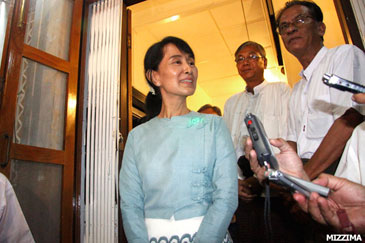Chiang Mai (Mizzima) – Burma’s most influential pro-democracy group will take its case to the international community this week, asking for help from the UN Human Rights Council following the government’s dissolving its status as a legal political party.

The National League for Democracy (NLD) General-Secretary Aung San Suu Kyi said earlier that a complaint letter would be filed within the first week of August.
“We will submit it this week. Until we send it, we cannot disclose the details of the complaint,” Nyan Win, a legal adviser and NLD central executive committee member, told Mizzima.
The complaint letter will cite examples of government oppression of human rights, violations of the rights of political parties and organizations and the “Depayin Massacre,” in which a government-supported mob killed many NLD members and tried to kill Aung San Suu Kyi. It will also cite examples of manipulation in the 2010 election, according to the NLD.
The Union Election Commission (UEC) officially dissolved the NLD on September 14, 2010, citing its failure to re-register as a political party. The NLD filed appeals signed by Suu Kyi, but they were rejected by various courts, prompting the appeal to the UN Human Rights Council, said Nyan Win. He said that the NLD did not plan to cooperate with other political parties that were also dissolved.
The NLD won the 1990 general election in a landslide with about 82 percent of the seats, but the former junta refused to convene Parliament. The NLD boycotted the 2010 general election, the first since 1990, on the grounds that the 2008 Constitution was undemocratic and drawn up in favour of the then-military government.
Meanwhile, Pu Chin Sian Thang, the spokesman of the United Nationalities Alliance (UNA) and chairman of the Zomi National Congress, said he was watching the NLD action, but did not believe that the UN Human Rights Council could influence the Burmese government. The UNA is a coalition of ethnic political parties that contested in the 1990-general elections.
“There is no office of the UN Human Rights Council in Burma. I don’t think the UN can influence this government,” Pu Chin Sian Thang told Mizzima.
During the previous two decades, the UN General Assembly has passed many resolutions urging the former Burmese junta to recognize the results of the 1990-general election, but the junta ignored them all.
In late March, 2011, the military junta transferred power to a government led by President Thein Sein, a former general.


